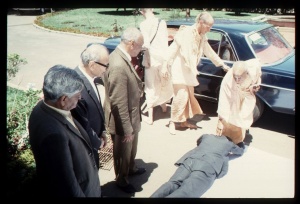CC Madhya 25.155: Difference between revisions
No edit summary |
(Vanibot #0054 edit - transform synonyms into clickable links, which search similar occurrences) |
||
| Line 19: | Line 19: | ||
<div class="synonyms"> | <div class="synonyms"> | ||
''brahma-bhūtaḥ'' | ''[//vanipedia.org/wiki/Special:VaniSearch?s=brahma&tab=syno_o&ds=1 brahma]-[//vanipedia.org/wiki/Special:VaniSearch?s=bhūtaḥ&tab=syno_o&ds=1 bhūtaḥ]'' — freed from material conceptions of life but attached to an impersonal situation; ''[//vanipedia.org/wiki/Special:VaniSearch?s=prasanna&tab=syno_o&ds=1 prasanna]-[//vanipedia.org/wiki/Special:VaniSearch?s=ātmā&tab=syno_o&ds=1 ātmā]'' — fully joyful; ''[//vanipedia.org/wiki/Special:VaniSearch?s=na&tab=syno_o&ds=1 na] [//vanipedia.org/wiki/Special:VaniSearch?s=śocati&tab=syno_o&ds=1 śocati]'' — he does not lament; ''[//vanipedia.org/wiki/Special:VaniSearch?s=na&tab=syno_o&ds=1 na] [//vanipedia.org/wiki/Special:VaniSearch?s=kāṅkṣati&tab=syno_o&ds=1 kāṅkṣati]'' — he does not hanker; ''[//vanipedia.org/wiki/Special:VaniSearch?s=samaḥ&tab=syno_o&ds=1 samaḥ]'' — equally disposed; ''[//vanipedia.org/wiki/Special:VaniSearch?s=sarveṣu&tab=syno_o&ds=1 sarveṣu]'' — all; ''[//vanipedia.org/wiki/Special:VaniSearch?s=bhūteṣu&tab=syno_o&ds=1 bhūteṣu]'' — to the living entities; ''[//vanipedia.org/wiki/Special:VaniSearch?s=mat&tab=syno_o&ds=1 mat]-[//vanipedia.org/wiki/Special:VaniSearch?s=bhaktim&tab=syno_o&ds=1 bhaktim]'' — My devotional service; ''[//vanipedia.org/wiki/Special:VaniSearch?s=labhate&tab=syno_o&ds=1 labhate]'' — achieves; ''[//vanipedia.org/wiki/Special:VaniSearch?s=parām&tab=syno_o&ds=1 parām]'' — transcendental. | ||
</div> | </div> | ||
Latest revision as of 23:13, 19 February 2024

A.C. Bhaktivedanta Swami Prabhupada
TEXT 155
- brahma-bhūtaḥ prasannātmā
- na śocati na kāṅkṣati
- samaḥ sarveṣu bhūteṣu
- mad-bhaktiṁ labhate parām
SYNONYMS
brahma-bhūtaḥ — freed from material conceptions of life but attached to an impersonal situation; prasanna-ātmā — fully joyful; na śocati — he does not lament; na kāṅkṣati — he does not hanker; samaḥ — equally disposed; sarveṣu — all; bhūteṣu — to the living entities; mat-bhaktim — My devotional service; labhate — achieves; parām — transcendental.
TRANSLATION
"'One who is thus transcendentally situated at once realizes the Supreme Brahman and becomes fully joyful. He never laments or desires to have anything. He is equally disposed toward every living entity. In that state he attains pure devotional service unto Me.'
PURPORT
This is a verse from the Bhagavad-gītā (BG 18.54).